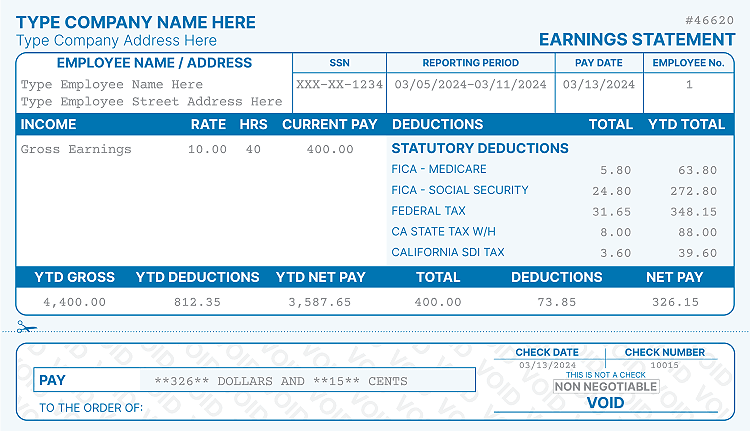The Importance of Employment Verification and How to Provide It
- Home
- Blog
- Employment
- The Importance of Employment Verification and How to Provide It
When your company has an open position and you are in the process of looking for the best new employee for the job, it is likely you will collect dozens of resumes from eager job seekers.
As an employer, it’s important to do everything you can to make sure your job candidates truly have the experience listed on their resumes, and you can do that by confirming their work history using verification of employment.
What is Verification of Employment?

Verification of employment is the process of confirming a person’s work history as well as their employment and income information. It can be useful whether you are a business owner looking to hire new employees, an individual hoping to get approved for a loan or lease, or if you need verification for a visa or green card.
When a person’s employment is verified, it ensures they have the experience needed to perform specific job tasks well. But you should be aware that employment verification can also show discrepancies in an individual’s work history. It can reveal false employment claims on a resume, show any gaps in employment history that may not have been noted on a resume, and disclose the fabrication of job titles.
Therefore, it is very important that resumes and job applications always have the most accurate details concerning current and past work history.
Verification of employment is an important part of any job screening process because it can show potential employers if their candidates are reliable, trustworthy and a good choice for the job they are offering.
There are several documents that may be used to verify a person's employment or work history. You can use a letter of employment, online pay stubs, references, unemployment records, or a letter of termination.
Why is Verification of Employment Needed?
Verification of employment serves multiple purposes. As mentioned, it can help ensure everything a person has on their resume is true. It can also be helpful if an employee is applying for a mortgage or other type of loan because it shows proof of income, the payment received within a given pay period, and everything listed on the application about their job.
Verifying employment can help hiring managers easily filter through their pool of candidates and only focus on applicants who have specific, confirmed qualifications for their job opening.
Here are a few more reasons why employment verifications are important.
It Ensures FCRA Compliance
The FCRA (Fair Credit Reporting Act) holds a regulation that requires employers to have candidates' permission before they conduct a background check. To remain compliant with the FCRA, the employer must be sure their complete process is compliant with all aspects of the law.
It Helps to Prevent Workplace Violence
At least two million American workers are victims of workplace violence every year. While not all cases are due to a lack of screening, most could have been prevented with the correct process. If a potential hire has a criminal record of violence, it will show up on their employment verification to warn the employer.
It Helps Prevent Workplace Theft
According to the U.S. Chamber of Commerce, workplace theft costs companies between $20 and $40 billion each year. U.S. consumers take on this additional cost at a yearly rate of $400 for each working adult.
An employee is 15 times more likely to steal from their employer than a non-employee, so conducting employment verifications can help you find out about any past workplace theft and avoid it altogether.
What are the Different Ways Employment Can Be Verified?

There is more than one way to verify past employment. Here are some of the most commonly used methods.
Work Number Database
The Work Number database is the largest collection of income and employment information. This user-friendly database is owned by Equifax and is used by many trusted organizations including John Carroll University and the U.S. Department of Labor. It features information contributed by over 1.2 million employers.
Employment Verification Letter
This is the most common method of employment verification. An employment verification letter, also known as a job verification letter or letter of employment, includes the person in question’s former job title, the dates they were hired and when they left the job, and their salary.
The letter may also include a list of job duties the person had as an additional form of reference and details about the company such as their name, business address and their contact details.
An employment verification letter is a great way to prove employment because it is sent directly from the former employer and eliminates the need for any hiring managers to contact the former employer for verification in the future.
Past Pay Stubs
Pay stubs can provide proof of work history as well as proof of income or salary. This is a highly efficient method of employment verification because pay check stubs usually show dates and times, among other useful details. In most cases, three months’ worth of paycheck stubs is enough to verify a person’s employment with a company.
References From Former Bosses or Supervisors
Another good way to provide verification of employment is through a work reference. With this method, a former employer or supervisor would verify by email or phone call that the person worked for their business. They may also provide information about their experience working with them and how well they performed their duties.
Who is Authorized to Verify Employment?
Any past employer can verify employment. However, some U.S. states have enforced laws regarding the use of that type of information.
For instance, in some states, an employer may provide information about a former employee only with the employee’s consent. There are also some states that give employers who provide information immunity so that their former employees cannot sue them for defamation.
According to the U.S. Equal Employment Opportunity Commission (EEOC) which is responsible for enforcing federal laws against employment discrimination, it is not illegal for an employer to ask questions about a job applicant’s background history, aside from certain medical information.
However, it is against the law for an employer to conduct a background check or attempt an employment verification on an applicant in a manner deemed unfair or that denies them equal employment opportunities.
Therefore, it’s important to find out if these rules apply to your state before you start to request or provide this sensitive information.
Employers will often get requests for employment verification from prospective employers, collection agencies, government agencies, immigration services or lenders. Still, just because they receive the request doesn’t mean the employer legally has to respond to it.
Any time an employer receives a request for an employment data report, they should first review the laws in their state to determine what information they can provide. If the request is from state or federal government agencies, the employer is usually required to respond. They do not have to respond to any request from collection agencies or other similar entities.
How Long Do Employment Verifications Take to Complete?

If you decide to use your internal resources such as your HR department to verify a potential employee’s work history, the amount of time it takes to complete the process varies based on factors such as:
- How many prospects you are screening
- How fast the applicant’s former employer will provide the information
- How many jobs the applicant is applying for
- How many team members are working on verifications
- How easy it is to retrieve the correct contact information for the former employer
With all of these factors combined, it can take anywhere from a few days to a couple of weeks before you get all the information needed in order to verify the work history of some of your potential new hires. But it's essential that you take the time to receive all the details listed on the employment data report.
What if a Company is No Longer in Business? How Can an Employer Verify Employment and Income Information?
While it can be difficult to verify employment and income information for an individual when the company they once worked for is no longer in business, it is not impossible.
There are several methods that may be used to verify an individual’s work history, allowing them to move forward and find new work opportunities or apply for a loan.
Some of the documents that may be used in this situation to verify past employment include:
- A job termination or separation letter
- Pay stubs or direct deposit notifications
- Unemployment claims documents
- Tax forms
- Referral letters from former bosses or supervisors
- Employment contracts and agreements
Final Thoughts on Importance of Employment Verification
It is necessary for many reasons to verify a new employee’s work history. Doing so can save you from hiring the wrong person due to false information on their application or resume.
If you are a business owner and want to ensure your employees always have reliable resources to help them verify their employment with you, you should check out our pay stub generator here at Real Check Stubs. Create your own customized pay stubs online using our check stub maker quickly and efficiently.

